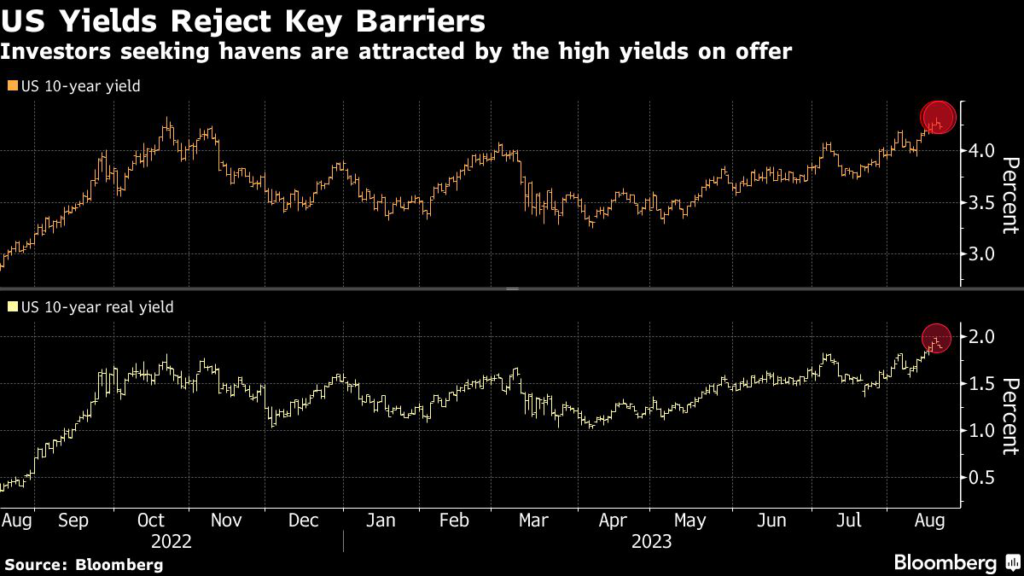Global bonds won some respite Friday from the selloff that lifted yields to multiyear highs as stock market declines stoked demand for lower-risk assets.
(Bloomberg) — Global bonds won some respite Friday from the selloff that lifted yields to multiyear highs as stock market declines stoked demand for lower-risk assets.
European debt led the gains, driving down Germany’s 10-year yield by 11 basis points to 2.60%, in a catch up with a recovery in Treasuries late Thursday.
The equivalent US yield also fell, snapping the longest streak of increases in three months, with the benchmark global rate at about 4.23% late in the morning.
It’s been another tough week for bond investors as markets continued to flip-flop between growth and inflation fears amid thin liquidity that’s typical at this time of year.
Friday’s moves hinted at demand for haven assets as concerns over China’s economy mount, with poor UK retail sales adding to the cautious tone.
“Both are bond positive,” said Francesco Maria Di Bella, a fixed income strategist at UniCredit SpA in Milan.
“In addition, yields have increased materially in the past few days, making government bonds more appealing.”
Yields still remain higher on the week, after hitting a 15-year peak in the UK and the most since 2011 for the US 30-year on Thursday.
This week’s selloff was led by the US, after a slew of strong economic data and hawkish Federal Reserve meeting minutes fueled the prospect of interest rates staying higher for longer at a time of heavy government debt issuance.
There’s also been a pattern of selling coming in as US traders begin their day — as it happened Friday, with Treasury yields rebounding from nearly the cheapest levels of the session from around 8 a.m.
to 8:20 a.m. New York time.
“It feels bond buyers have gone off to vacation, but we do view this as a buy,” Kelsey Berro, a fixed-income portfolio manager at JPMorgan Asset Management, said on Bloomberg Television.
“When the Fed stops, everybody thinks we have engineered a soft landing.”
“We are trying to assess: Is this another soft landing or is this potentially a false signal? There’s a couple things we are seeing now that indicate to us that things may get a little more tricky,” Berro added.
Investors are now looking to next week’s data, when manufacturing and services figures will offer new clues over the health of the economy on both sides of the Atlantic.
While European Central Bank Chief Economist Philip Lane believes there are reasons to think Europe will grow over the next couple of years, the region’s resilience after 425 basis points of rate hikes remains unclear.
“Bonds may remain range bound in the near term, but our view is that the ECB’s tightening will eventually break something and then bonds will rally as rate cuts get priced in,” said Charles Diebel, head of fixed income at Mediolanum.
Exacerbating those fears is the escalating crisis in China, where Xi Jinping’s government is grappling with issues in its shadow banking sector and a property selloff.
Read more: BofA’s Warning of a ‘5% World’ Sinks In as Bond Yields Surge
The bigger yield rises in the US have increased their gap to German yields to 161 basis points, the most since December on a closing basis.
The US weakness has been driven by real rates, with the yield on the 10-year Treasury Inflation-Protected Security nearing 2% Thursday for the first time since 2009.
The UK’s bonds have also underperformed.
They recovered some ground Friday, with yields around seven basis points lower, as traders trimmed bets on the Bank of England’s peak rate after retail sales data fell more than expected last month.
–With assistance from Anchalee Worrachate, Naomi Tajitsu, Liz Capo McCormick, Ye Xie and Aline Oyamada.
(Updates rates throughout, adds fund manager comments in seventh paragraph.)
More stories like this are available on bloomberg.com
©2023 Bloomberg L.P.










